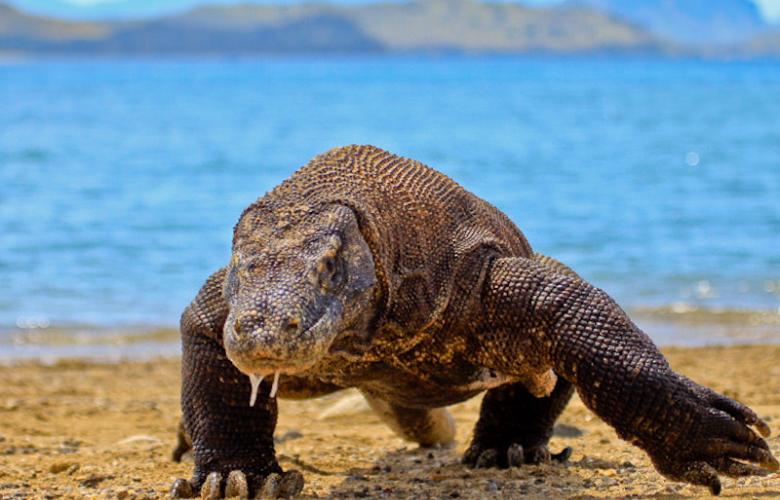NTT administration and central government disagree over plans to close Komodo Island in 2020
Contact
NTT administration and central government disagree over plans to close Komodo Island in 2020
In an attempt to protect the world's largest lizards, commonly known as Komodo Dragons, the governor of East Nusa Tenggara (NTT) plans to close Komodo Island for one year to revitalize the Dragon population and the wildlife they feed on. But the impact this would have on the region's tourism industry is raising concerns in Jakarta.
The initiative to temporarily close Komodo Island for a year in 2020 is a controversial one, but NTT governor, Viktor Bungtilu Laiskodat, seems determined to see the plan through.
Originally, Viktor was keen to close the entire Komodo National Park, which consists of more than 170 islands including Komodo, but resistance from the local tourism industry proved to be too strong and so the scheme has since been revised to just one island.
Deer poaching
The main reason for the drastic measure is to help replenish the population of Dragons by protecting their natural habitat, and importantly, their main source of food - a deer native to the park's islands.
According to local news wires, the falling numbers in the deer population has become a serious threat, which the local administration fears could have a significant impact not only on Komodo Dragon numbers, but also on the size the giant lizards can grow.
The Smithsonian National Zoological Park says the average length of a male Komodo Dragon is between eight to nine feet weighing up to a hefty 200 lbs. but they can grow even larger.
Joint commitments
In a recent meeting between the NTT Provincial Government, West Manggarai Regency, and the Ministry of Environment and Forestry, NTT Tourism Office head Marius Ardu Jelamu is quoted by Kompas as claiming the closure of Komodo Island would be a joint commitment between the NTT Provincial Government and the Ministry of Environment and Forestry, who have agreed to share management and responsibilities.
The South China Morning Post (SCMP) are reporting the World Wide Fund for Nature believes Komodo Dragons are extremely vulnerable to extinction because of human activity, such as the poaching of their prey, and any closure aimed at boosting the giant lizard population would be supported by environmentalists.
But the central government appears resistant.
Is irrelevance a strong argument?
Tourism Minister Arief Yahya believes the plan is 'irrelevant' and would only cause trouble for travel agencies, stressing that securing travel packages to the park was more important than securing the park’s animal population.
Further discussion between the relevant ministries is being planned but considering the government is actively promoting tourism to be the country's leading foreign exchange earner and as Komodo National park is one of the designated '10 New Bali's' it seems likely further compromise will have to be reached, particularly as visitor arrivals are on the rise.
Komodo National Park welcomed 176,830 arrivals last year, which was a 48 percent increase over 2017 according to the SCMP and TTG Asia. And as these numbers continue to grow, so too does the local economy.
Finding a balance for a brighter future
The balance between protecting the environment and supporting the country's tourism industry is a delicate one. If nothing was done and the Dragons were to become extinct for example, tourism to these remote eastern islands would certainly struggle and so too would the 4,500 local people involved in the region's tourism industry.
Andrzej Barski, Principal of Harcourts Seven Stones is more than aware that balance needs to be found and compromises have to be made because he believes private businesses and government need to collaborate and see the bigger picture. "Sustainability is the key to a brighter future for all stakeholders," he explained to WILLIAMS MEDIA, pointing to the recent temporary closures of Maya Bay on Phi Phi Island in Thailand and Boracay in The Philippines, as examples of 'tough love.'
Inconvenient truths
"If countries and destinations ignore environmental basics they run the very real risk of destroying the very reasons visitors go there in the first place," explained Barski. "Look at what Bali has done since January 1 with the banning of single use plastic bags and straws. It hasn't fixed the terrible trash problem the island's created, but political will has become more aware and it is a positive step in the right direction. Likewise, the decisions made by The Philippines and Thailand could not have been easy and without doubt they have impacted local economies - but these inconveniences are temporary as tourism will bounce back, especially as more and more people are choosing destinations because of their environmental mindset."
Sources: Coconuts Bali, Kompas, Tempo, The Jakarta Post, TTG Asia, Live Science
Similar to this:
Lombok set for growth as AirAsia intends to develop new hub?





